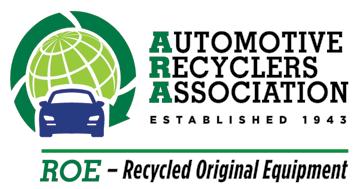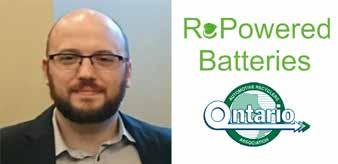
44 minute read
Gloria’s Note La note de Gloria 06
Joining the team
In January, RePowered Batteries joined the Ontario Automotive Recyclers Association as an Associate Member.
Headquartered in Gatineau, Quebec, RePowered takes electric vehicle batteries and repurposes them for future use in everything from solar power storage systems to grocery store grids.
“RePowered Batteries take batteries from end-of-life electric vehicles and dismantle them to build new batteries for micro-grid systems. Like a big backup battery,” said Julien Lemay, CEO of RePowered Batteries.
“The goal is to give batteries a second life—to extend the life of electric vehicle batteries, reduce the reliance on new material and also delay their recycling so that methods have improved by the time they get to recycling and metal extraction.”
Last year, RePowered Batteries set up its pilot plant.
“We see immense value in being properly connected to Canada’s auto recyclers,” said Lemay. “They are an integral part of our value chain. Joining OARA as a member makes perfect sense for us.”
Lemay is also the founder of the Canadian Second Life Battery Assocation, an organization advocating as a unified voice for second-life battery manufacturers.
You can learn more about the organization by visiting cslba.ca.
Julien Lemay, CEO of Repowered Batteries.
Data Drive
The Automotive Industries Association of Canada (AIA Canada) is urging collision repairers to take action in the fight for access to vehicle data.
During a January Your Data. Your Choice webinar session, J.F. Champagne, AIA Canada president and Bill Hanvey, CEO of the U.S.based Auto Care Association, delved into details of the campaign and provided an update on its progress as collision repairers across North America fight for access to vehicle data.
“Of course, we all like the convenience technology brings, but 85 percent of vehicle owners are unaware the vehicles transmit data and that access to that data is being threatened,” said Hanvey.
Within the next two years, AIA Canada predicts up to 95 percent of all new cars sold in Canada will be connected cars—vehicles that are constantly communicating information in real time to automak-ers. According to Hanvey, automakers in the U.S. have spent US$30 million defending OEM control of data in the courts.
“Unless automakers are forced by regulations, they aren’t going to release that control,” said Champagne.
“We’ve tried—and quite honestly, we haven’t been taken seriously. The only way to rectify this is through legislation,” said Hanvey. “We need the petition signatures to say, ‘look, the consumers have spoken’ with 100,000 signatures in Canada and 150,000 in the U.S.”

Scrap in Saskatchewan
The government of Saskatchewan has introduced legislation with the aim of tightening up regulations surrounding scrap metal theft in the province.
The legislation includes an update to the Pawned Property Amendment Act and the requirements for reporting for scrap metal dealers.
The changes would require that dealers obtain and record the identification and transaction information of the client from whom they are purchasing scrap metal, as well as the imposition of further restrictions on cash transactions in the attempt to curb the anonymous sale of stolen scrap metal.
Theft of scrap metal, copper wiring and automotive parts has been on the rise nationwide over the last several years. However, the isolation of many rural residences in Saskatchewan makes the province an even more appealing home base for would-be thieves.
As well, changes to the Traffic Safety Act will give police the ability to press charges for numerous actions commonly associated with auto theft, such as falsifying documents for the sale or registration of a vehicle or altering a VIN.
Currently, police have to investigate and charge someone under the Criminal Code. The proposed changes will give police the ability to issue a summary offence ticket without requiring Criminal Code proceedings.
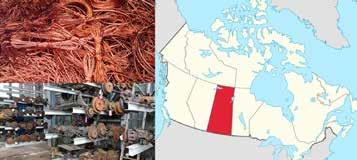
The government of Saskatchewan has introduced legislation with the aim of tightening up regulations surrounding scrap metal theft in the province.
Automaker resistance is nothing new to the collision repair industry. While the sector has been reliant on on-board diagnostics for repairs since the 1980s, there was a time the automaker fought for repairer access to these systems.
“We need to fix cars right. Access to the right information in an or-derly fashion is no question—the access to vehicle data absolutely ties into the quality of collision repair,” said Champagne.
Currently, the same OEM restrictions that prevent collision repair facilities from accessing data from vehicles also prevents auto recyclers from gaining access to information which would make it far more prof-itable to dismantle connected vehicles.
Vehicle recyclers are calling on the World Trade Organization (WTO) to pursue legal solutions and best-practices recommendations that eliminate the harmful practices of vehicles and components manufactured to electronically block the re-use of parts.
A proposal has been composed by FORS Association from Poland in cooperation with several other vehicle recycling associations from around the world, to the WTO.
This proposal is expected to highlight the problems vehicle recyclers face when it comes to electronic security features on vehicles, and how if dismantlers had access to unlock these features, there would be the possibility to re-use more parts.
The proposal is calling for the WTO to look at legal solutions to eliminate ‘harmful practices of vehicle and component manufacturers to electronically block the re-use of parts. Vehicle recyclers are appealing that consumers and car operations can have electronic security unblocked free of charge so that removed parts can be used in other vehicles.
New Lease on Lithium-Ion
A PhD student from Dalhousie University has cracked the secret to reincarnation—for retired electric vehicle batteries, of course, which he is hoping will fuel the power grids of the future.
Chris White is looking for ways to convert “second-life” EV batteries to renewable energy sources that may one day be used to power electric grids.
“We want to convert things that run on fossil fuels to run on electricity,” said White in an interview with The Chronicle Harold. “So battery-powered electric vehicles instead of gas-powered cars. And electric heating instead of oil and gas furnaces.
“And then we want to convert our electricity systems to run on renewables instead of fossil fuels, so the electricity we’re using for our cars is clean and not coming from coal power plants, for example.”
White identifies an issue that has yet to be solved when it comes to EV batteries, however.
“And another problem is that electric vehicle batteries—EV batteries—will eventually end up as waste,” said White. “We’re already producing millions of EVs per year and this will soon be tens of millions per year and every EV has a large lithium-ion battery. The biggest ones I’ve seen are about the size of a double mattress.”
Controlled Collisions
End-of-life-vehicles are providing Ajax’s first responders with life-saving training opportunities thanks to a partnership between the city’s fire and emergency services and their local auto recycler, Dave Langille of Durham Auto Parts.
In late October, Ajax Fire and Emergency Services took part in a training session involving a decommissioned city bus that first responders had the opportunity to manipulate into various accident scenarios, providing what Ajax fire chief training officer Reno Levesque considers to be an invaluable training experience.
This ongoing relationship also allows first responders to stay up-to-date on changing vehicle materials and technologies that may affect their ability to respond to an emergency.
Levesque notes that addressing and adapting to these changing technologies has become a priority for emergency response education.
“That’s a huge component of what we do now. With all the airbags and different safety systems that are in there. There are different means of transport, not just traditional gasoline engines. All of that vehicle technology is really important to us.
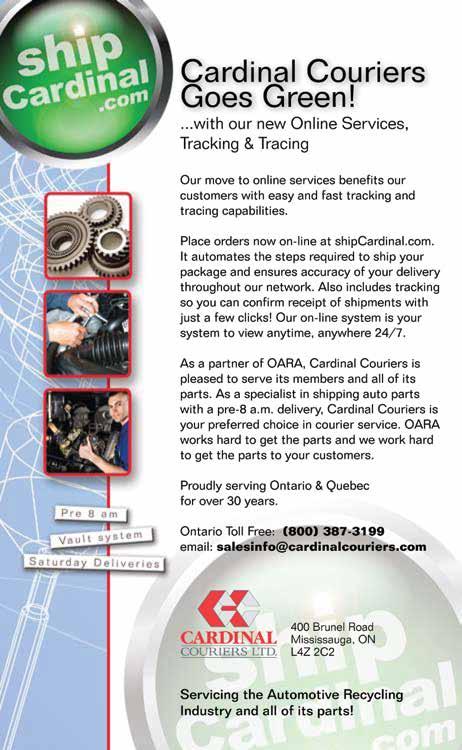
Maritime Marauders
In January, a Newfoundland auto recycling facility lost $8,000 worth of scrap auto parts after thieves cut their way into a metal shipping container.
Leaving a square hole making that looked as though it was cut by an oversized can-opener, the criminals managed to make off with copper wire, car batteries and catalytic converters from Newco Metal and Auto Recycling in Marystown, Newfoundland.
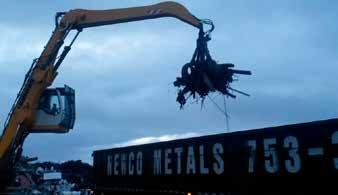
Newco Metal and Auto Recycling, located in Marystown, Newfoundland.
Retire Your Ride Thrives
Canadians appear to be rethinking the need for secondary vehicles during the social isolation era. Or with fewer miles driven, it makes maintenance a bit harder and more costly to keep that older vehicle on the road. Either way, for many it appears to be the perfect time to cash in on selling, according to a report from the Automotive Recyclers of Canada (ARC).
The Retire Your Ride program, managed by ARC as an exclusive benefit for its Members, is there to help Canadians navigate the proper and final disposal of their older vehicle and provide a healthy financial return at the same time.
Auto recyclers are always hungry for vehicles to part out for inventory, and with fewer vehicles at the salvage auctions, many have turned to Retire Your Ride to help fill their buying needs.
In addition scrap prices – especially prices for precious metals found in catalytic converters – have risen sharply.
This has resulted in a year-over-year increase consumers are seeing with the Retire Your Ride program of up to 30%, according to the auto recycling advocacy group.
“People are staying at home, worrying about money, and certainly driving less. Many people are making the decision to get rid of secondary vehicles,” said the ARC’s executive director Steve Fletcher.
“Auto recyclers, too, are making good use of the program. As salvage prices have gone up, Retire Your Ride has begun to become a more appealing place to turn.”
The program allows drivers to put their vehicle up for bid among certified ARC auto recyclers, with the highest bid being paid out to the driver (as well as a free tow). The winner bidder picks the clunker up at the owner’s home free of charge and the owner gets paid at the door.
Winning bids vary by province, type of vehicle, condition, and location with an average bid in the $200 to $500 range.
The Retire Your Ride program became popular during the great recession of 2008 – 2009. Started as the National Vehicle Scrappage
Conference to commence
Members of the automotive recycling industry are salvaging up some excitement for the United Recyclers Group (URG) Training Conference, set to kick off August 5th to August 7th in Dallas, Texas.
The theme of this year’s event will centre around “The Challenge of Change” and how the auto recycling industry has worked to adjust to the new normal of 2020, as well as new challenges that could arise in 2021.
The conference will also play host to URG’s annual golf tournament to benefit the URG Scholarship Foundation. Entry for the tournament costs $200 at the door or $175 with early bird registration.
The URG Training Conference is currently scheduled for August 5-7 at the Hyatt Regency in Dallas Texas. A standard full conference ticket costs $450.
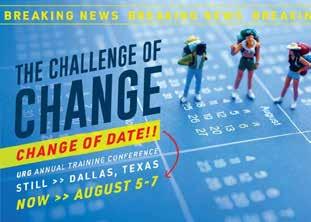
program, ARC assumed control of the program in 2012 and began a series of improvements and efficiencies. Today, the auction process retires 10 to 20 cars a day across Canada, and uses the ARC network of certified auto recyclers to ensure each vehicle is retired responsibly. Each sale is tracked to make sure the car is scrapped.
ARC also runs the Car Heaven program. Operating similar to Retire Your Ride, but for these vehicles, the donor gets a tax receipt for the value of their vehicle, and one of 40 national and local charities gets the full proceeds of sale of the vehicle. Since 2000, ARC has raised over $4.2 million for charities through Car Heaven.
Recently there has been a lot of discussion about bringing back a national vehicle scrappage programs. Should manufacturers or the government be considering a scrappage program, Fletcher offers his advice: “First of all, go with a reasonable incentive in the $1,000 range as they did in the past, with either the automaker or government or combination funding that amount. Anything over that threatens the used car market.”
“We are looking at the big picture. We want to make people aware that the Retire Your Ride program is still operating. We still have the network of certified auto recyclers. We still use the database engine that drove the original national scrappage program. We still have the brand awareness of Retire Your Ride as the only national vehicle retirement program.
So, if someone wants to put an incentive behind it and turbocharge it, we have the tow trucks, recycling yards, and capacity to handle all of that throughout Canada.”
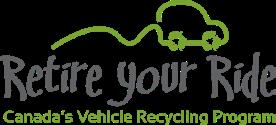
Running Regulations Fuelled by Ford
The United Nations Environment Programme (UNEP) is prepared to take part in a new initiation supporting the introduction of global minimum used vehicle standards, following a United Nations (UN) report revealing a significant effect on the environment and climate change.
A recently released United Nations (UN) report, based on an in-depth analysis of 146 countries, found that some two-thirds of them have ‘weak’ or ‘very weak’ policies to regulate the import of used vehicles.
According to the report, the fast-growing global vehicle fleet is a major contributor to air pollution and climate change. The UN says, globally, the transport sector is responsible for nearly a quarter of energy-related global greenhouse gas emissions. Specifically, vehicle emissions are a significant source of fine particulate matter (PM2.5) and nitrogen oxides (NOx) that are major causes of urban air pollution.
The export of vehicles that should be recycled domestically is also a major issues for auto recyclers around the globe.
Ford is not only the most popular automaker in Canada—the automaker’s models are also the most common brand retired through Canada’s Retire Your Ride vehicle recycling program in the last year.
Out of all Ford models, the Escape and Focus were retired the most often through the program.
The most popular vehicle recycled is the 2004 Honda Civic with 32 vehicles across Canada turned in, and in fact, five of the top 10 vehicles retired were Honda Civics.
While brand loyalty isn’t quite the force in the automotive world that it once was, there are still plenty of people who have a preferred car brand and stick with it. It could very well be that Ford owners deciding to retire their ride this year, simply purchased another Ford.
Ford sold 60,582 units in 2019 to beat out its competitors, and about half of that number was solely from sales of the extremely popular F-150.
Ford’s models are not only the most popular vehicles in Canada—they were also the most common brand retired through Canada’s Retire Your Ride vehicle recycling program in 2019.
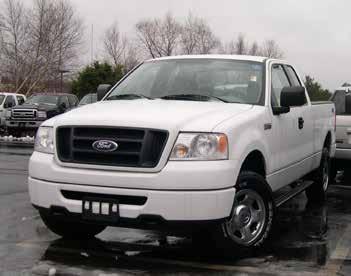
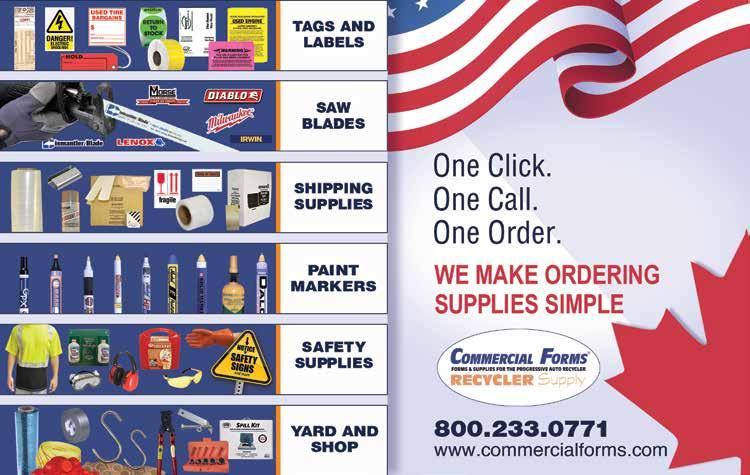
The Rush of the Crush
The recycling industry has a brand-new mobile game made just for them—Scrapyard Tycoon is here, available on all iOS and Android devices.
This latest idle game from Neon Play allows players to operate their very own scrapyard.
You can make decisions like whether you want to crush cars or recycle them; you can even break your cars down into parts to sell.
Take control of a crane, a car crusher, fill your warehouse up with spare parts—the choice is yours.
As well, players can acquire blueprints and craft new items that will help restore their vehicles and turn a profit for the scrapyard.
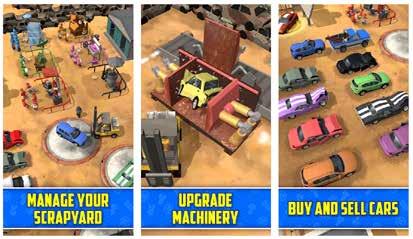
Take your latest business ideas virtual with this new app, available on Android and iOS.
EZ Additions
EZ Suite is excited to announce two new additions to their team with Chris Atencio and Laurie Woods joining the company in management positions.
Atencio will be taking the lead as director of sales while Woods will be responsible for customer relations while at EZ.
Atencio joins the company with more than 20 years of experience, most recently as national sales director at CCC Pinnacle.
On the other hand, Woods will be coming on board with more than 30 years of experience in the auto recycling industry working in a number of roles; focussing mainly on the training and implementation of software products.
Chris Atencio, director of strategic relations for EZ Suite. Laurie Woods, director of customer relations for EZ Suite.
CELEBRATING ALL OF YOU
You are Canadian Auto Recycler
Seeing Canada’s automotive recyclers unite in solidarity and fare through this global crisis has been nothing short of inspiring.
Life as we knew it became scrambled when the COVID-19 pandemic first gripped Canada last March. One of the annual events I cherish most, and the first grand meeting of 2020—the Ontario Automotive Recyclers Association Convention and Trade Show—was cancelled.
When faced with disruption, we are given two choices: give up, or keep moving.
Canada’s auto recyclers chose the latter. Deemed an essential business, they carried on—many of them providing their crucial services to Canadian drivers in need. Beyond that, this community was there to support each other—as it always has been.
In my many years working alongside our nation’s automotive recyclers, I’ve always been deeply motivated by the dedication these hardworking professionals bring to their trade. That is a fact I know will never change.
To every auto recycler out there giving it their all each and every day—I appreciate you. Canadian Auto Recyclers celebrates you. Without your passion, persistence and perseverance, this industry would be an entirely different world. — Gloria Mann, Canadian Auto Recyclers Magazine
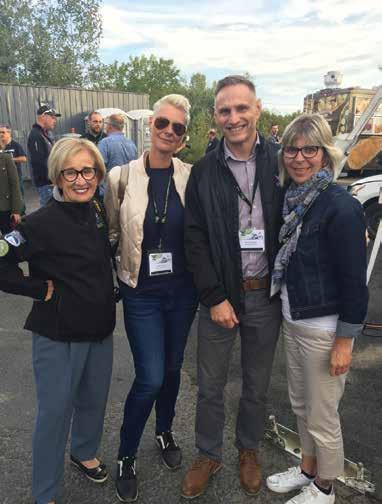
The auto recycling industry is finally getting some of the star power it deserves as YouTube-based “picking” show Totaled Treasure released its second episode in late-December.
Styled in a similar vein to shows like “Canadian Pickers” and “Storage Wars”, “Totaled Treasure” follows Vince Edivan and Aaron Stone as they travel across America visiting auto recycling facilities to dig through the abandoned vehicles in search of valuable, interesting, or just plain strange artifacts.
Not only do the pair seek to entertain, however, but also spread awareness about what is an often overlooked but nevertheless vital aspect to the lifecycle of a vehicle.
The introduction of the show provides a brief overview of the history of auto recycling with much of the messaging of the show reinforcing the idea that what is abandoned is not necessarily junk.
Vince Edivan is the Director of Member Relations for the Automotive Recyclers Association (ARA) and brings his considerable marketing skills to promoting professional auto recyclers to each Totaled Treasure episode.
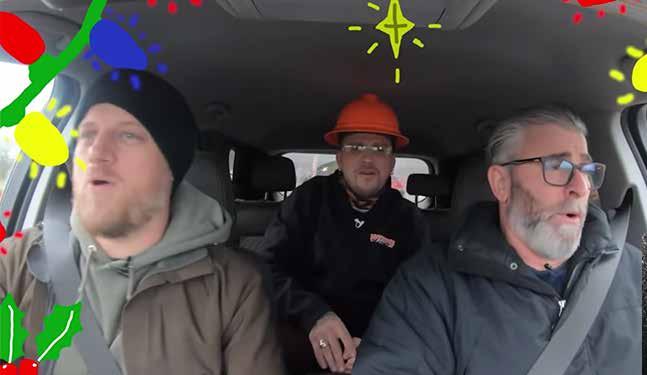
The auto recycling industry is finally getting some of the star power it deserves as YouTubebased “picking” show Totaled Treasure released its second episode in late-December.

The tightrope of triumph
As salvage prices skyrocket and a global pandemic keeps its customer base at home, Bastarache Auto Parts continues to thrive
La corde raide du triomphe
Alors que les prix de récupération montent en flèche et qu’une pandémie mondiale maintient sa clientèle à la maison, Bastarache Auto Parts continue de prospérer
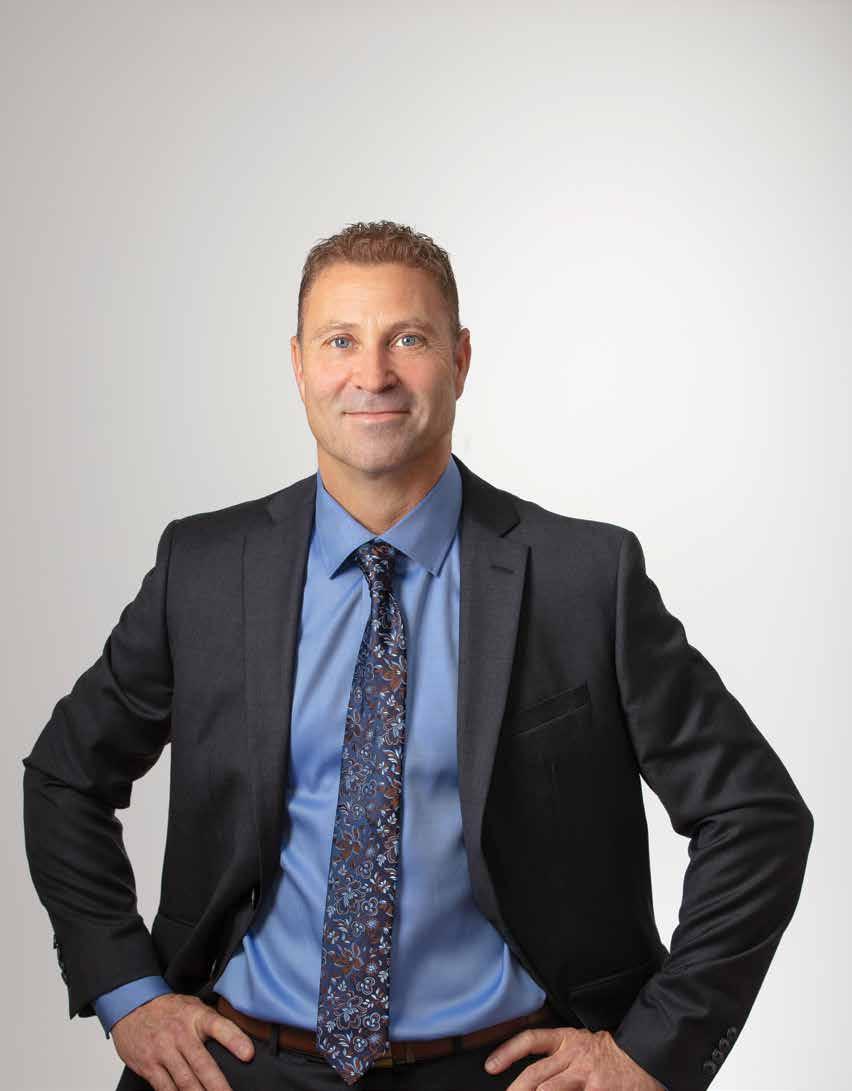
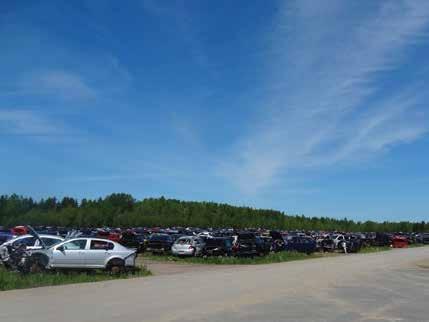
With more than 50 hectares (125 acres) of land available, Bastarache Auto Salvage tends to invest in newer vehicles with the potential to pay-off over the long-term. Avec plus de 50 hectares de terres disponibles, Bastarache Auto Salvage a tendance à investir dans des véhicules plus récents qui ont un potentiel de rentabilité à long terme.
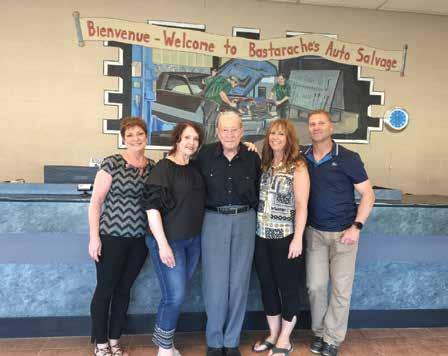
Helene Burke, Pauline Bourgeois, George Bastarache, Monique Babineau and/et Ron Bastarache.
By/Par Gideon Scanlon
Last spring, as COVID-19 made began to spread through North America, Ron Bastarache knew that it would be a rough year for the auto parts and recycling sector. The impact the pandemic had on his business, Bastarache Auto Salvage, was swift and significant. Over the course of a few days, businesses were closed, supply lines were cut and, perhaps most worryingly, people’s driving habits changed considerably.
“When the first cases of the virus arrived in Canada, things were unstable for at least a couple of weeks. With no travelling from out-of-province, and not much from within it, the number of walk-in clients we saw dropped significantly,” Ron recalls.
Business did not look like it would get back to normal for a long time. As the co-owner of the family business, Ron was concerned about it could survive the social isolation era.
There was a lot riding on it remaining in business—including the livelihood of the company’s 25 full-time employees.
“We are not a business that is comfortable letting people go for the sake of convenience. Our employees are mostly locals who have worked here for a long period of time.”
Many of them had been with the company for more than three decades. One, Vince Poirier—who Ron describes as a walking encyclopedia of auto parts information—had been with Bastarache Auto Parts for more than half-a-century.
Even the so-called ‘new guy’ would qualify as an experience industry veteran in most auto recycling facilities.
“The last guy who I hired joined us seven years ago—and he is still working for us,” says Ron.
Ron was not the only one shouldering the burdens of command during this stressful period. His sisters, fellow co-owners Helene Burke, Pauline Bourgeois and Monique Babineau were also concerned about the business— and its employees. L orsque les premiers rapports de patients atteints de coronavirus en Amérique du Nord ont été confirmés, Ron Bastarache de Barastache Auto Parts savait que le secteur des pièces automobiles et du recyclage était sur le point d’être déraciné.
«Lorsque le virus est arrivé pour la première fois au Canada, il était difficile, au moins pendant quelques semaines. Il n’y avait pas de déplacement depuis l’extérieur de la province, ce qui a réduit le nombre de clients sans rendez-vous », déclare Ron.
Les choses ne se sont pas améliorées rapidement. En quelques jours, des entreprises ont été fermées, des lignes d’approvisionnement coupées et - peut-être le plus inquiétant - les habitudes de conduite des gens ont considérablement changé.
En tant que copropriétaire de Barastache, Ron se demandait si l’entreprise serait en mesure de traverser l’ère de l’isolement social.
En plus de son stress, il y avait les moyens de subsistance des 25 employés à plein temps de l’entreprise. Nombre d’entre eux travaillaient dans l’entreprise depuis plus de trente ans, et un - Vince Poirrier, une encyclopédie ambulante d’informations sur les pièces automobiles - depuis plus de 50 ans.
Heureusement pour Ron, il n’était pas le seul à assumer le fardeau du commandement. Il partage ses responsabilités de leadership avec ses sœurs, Helen Burke, Monique Babineau et Pauline Bourgouis. En tant que plus jeune frère, Ron passe le plus clair de son temps à superviser les opérations extérieures et à organiser les achats de véhicules, tandis que ses sœurs gèrent l’énorme volume de paperasse de l’entreprise et la gestion des ventes à la maison.
«Nous avons une bonne relation. Nous avons tous notre part à faire, nous nous entendons tous et nous faisons tous notre travail.
Ron avait une autre personne à ses côtés pendant que le monde - et le secteur du recyclage automobile - était bouleversé par la pandémie. Son père, George Bastarache.
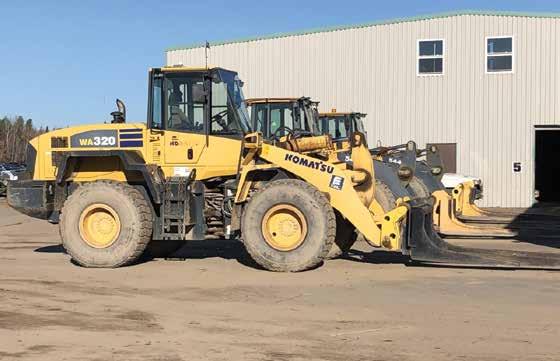
Before retiring from his leadership position, George Bastarache oversaw the construction of a huge new facility—including a 1,000 sq m warehouse, a new garage and an office building equipped with a cutting-edge computer inventory system. Vant de prendre sa retraite, George Bastarache a supervisé la construction d’une nouvelle installation gigantesque, comprenant un entrepôt de 1 000 mètres carrés, un nouveau garage et un immeuble de bureaux équipé d’un système d’inventaire informatique de pointe.
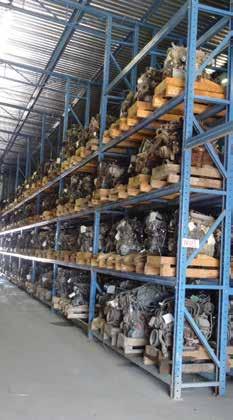
As the youngest sibling, Ron spends most of his time overseeing outdoor operations and organizing vehicle purchases while his sisters manage the business’ enormous volume of paperwork and front-of-house sales. Perhaps it is this shared approach to the management of the business which allowed them to chart a path through the crisis.
“We have a good relationship. We all have our part to do. We all get along well, and we all get our work done.”
His father, George Bastarache, was also prepared to offer his wisdom throughout the crisis. Though he has stepped away from his role as the business’s general manager, Ron’s father still visits the workplace on a daily basis.
“Since dad has been in the business for a long time, he dealt with the chal-
Aujourd’hui âgé de 90 ans, George avait fondé Bastarache Auto Parts en 1965. Passionné d’automobile né à Moncton, George avait été attiré par les lumières vives de Sudbury pendant les premières étapes du boom du nickel d’après-guerre. Après quelques années comme mineur à la mine Garson-Falconridge, George avait lancé son propre service de garage à Sudbury avant de retourner dans sa ville natale pour fonder Bastarache Auto Parts.
Sept ans après l’ouverture de l’entreprise, George a élargi l’entreprise avec un nouveau site sur un terrain de 60 acres. Au moment où il est passé à un rôle moins pratique dans l’entreprise en 2005, George avait également supervisé la construction d’un entrepôt de 9 000 pieds carrés et le développement d’un système d’inventaire informatique. Aujourd’hui, bien qu’il ne soit pas
“REGARDING THE EMPLOYEES, IT IS ESPECIALLY THE LOCALS WHO HAVE WORKED HERE FOR A LONG TIME. WE ARE NOT A COMPANY THAT IS COMFORTABLE LETTING PEOPLE GO FOR THE SAKE OF CONVENIENCE. THE LAST GUY I HIRED JOINED US SIX OR SEVEN YEARS AGO - AND HE’S STILL HERE.
lenges of building it up. Sure, my sisters and I have been able to grow it—but without the reputation he established for it, that wouldn’t have been possible.”
At 90 years old, the Shediac River-born founder of Bastarache Auto Parts had a lot of experience staying afloat—through good times and bad.
In 1950, at the height of the post-war nickel boom, George had been drawn in by the bright lights of Sudbury, Ontario.
Over the next 15 years, George made his way up in the world—first working as a miner at INCO’s Creighton Mine, before moving into a new role managing a gas station and garage. aussi activement impliqué dans la direction de l’entreprise qu’au cours des premières années du 21e siècle, George arrive toujours au travail et offre à ses enfants son propre point de vue expérimenté sur les problèmes auxquels ils sont confrontés.
«Mon père travaille dans cette entreprise depuis longtemps et a relevé les défis de la création de l’entreprise. Bien sûr, mes sœurs et moi avons pu le cultiver, mais sans la réputation qu’il a établie, cela n’aurait pas été possible. »
Malgré le soutien des membres de sa famille et de ses collègues, Ron a estimé que l’entreprise avait été malmenée. D’une part, le modèle commercial

A proud Acadian, though, George found himself returning to New Brunswick in 1965—the year he launched Bastarache Auto Salvage.
The business had a humble start. After operating outdoors and in a repurposed barn for its first four years, George decided it was time to expand the business. Investing in a nearby industrial lot, he spearheaded the construction of a new garage. For the next three decades, the business thrived—something Ron credits to George’s commitment to customer service.
“When I was young, my father said that, ‘When you get a customer who is not happy, you have to do your best to make it right for him,” recalls Ron, who says this lesson has stuck with him. “For example, if an engine is proven defective shortly after our six-month warranty, we will still honour it—depending on the situation.”
In 1994, as George moved into a less hands-on role in the company, he realized another expansion was needed if the business was going to continue to thrive. Before stepping away from a leadership role, he decided to oversee the construction of a huge new facility—including a 1,000 sq m warehouse, a new garage and an office building equipped with a cutting-edge computer inventory system.
Even with his sisters and father behind him, Ron was not confident about the position of the future of Bastarache Auto Salvage. For one thing, the business model, which had served the store so well for its first five decades, had become less reliable in the years leading up to the global pandemic.
“For many years, we depended on insurance companies’ auto salvage agreements to provide us with wrecked automobiles. At one point, we had seven salvage contracts. That dwindled to just two.”
Bastarache Auto Salvage is hardly alone in seeing its access to good, affordable damaged vehicles through insurance companies’ contracts. As vehicle salvage has become more expensive, auction houses have secured a place as a profit-generating middle-man in the trade of wrecks. qui avait si bien servi le magasin pendant ses cinq premières décennies était devenu moins fiable dans les années qui ont précédé la pandémie mondiale.
«Pendant de nombreuses années, nous nous sommes appuyés sur des contrats avec des compagnies d’assurance pour nous fournir des voitures accidentées. À un moment donné, nous en avions sept, mais maintenant, ce chiffre est tombé à deux seulement.
Barastache Auto Parts n’est pas la seule à voir son accès à des épaves d’automobiles fiables et peu coûteuses par l’intermédiaire des compagnies d’assurance commencer à se tarir. Comme la récupération de véhicules est devenue plus coûteuse, les maisons de ventes aux enchères sont venues se faire une place d’intermédiaire dans le commerce des épaves.
Cette tendance, bien sûr, signifiait que le travail de Ron en achetant des véhicules auprès des maisons de ventes aux enchères était devenu beaucoup plus important pour l’entreprise que par le passé. Cela signifiait également, cependant, que garantir un approvisionnement régulier en véhicules devenait de plus en plus coûteux, à la fois en termes de temps et d’argent.
«Il y a à peine 15 ans, nous roulions chaque année entre 1 500 et 2 000 voitures. Maintenant, nous avons tendance à avoir entre 1 200 et 1 500. »
Ensuite, bien sûr, il y a eu les changements de comportement des consommateurs - qui ont également précédé la pandémie.
«EN CE QUI CONCERNE LES EMPLOYÉS, CE SONT SURTOUT LES LOCAUX QUI TRAVAILLENT ICI DEPUIS LONGTEMPS. NOUS NE SOMMES PAS UNE ENTREPRISE QUI EST À L’AISE DE LAISSER LES GENS PARTIR POUR DES RAISONS DE COMMODITÉ. LE DERNIER GARS QUE J’AI EMBAUCHÉ S’EST JOINT À NOUS IL Y A SIX OU SEPT ANS - ET IL EST TOUJOURS LÀ.
«J’ai commencé à travailler ici à plein temps en 1988. Pour l’essentiel, notre ratio des ventes sans rendez-vous sur les ventes d’expédition était d’environ 85/15. Maintenant, bien sûr, nous sommes à environ 40-60, sinon égaux. “
Ici aussi, l’accent mis par Ron sur les ventes en ligne avait aidé l’entreprise à s’adapter. L’entreprise a été une des premières - et enthousiaste - à entrer dans le jeu du commerce de pièces intra-industrie.
«Auparavant, si nous n’avions pas la pièce, nous orientions nos clients vers quelqu’un qui le pourrait. Maintenant, bien sûr, nous essayons de le commander. Nos concurrents aussi. C’est un système qui signifie que nous travaillons ensemble, même lorsque nous sommes en concurrence, et d’une manière que nous n’avions jamais fait auparavant.
Bien que dirigé par Ron, il attribue à la philosophie d’entreprise de son père l’avoir aidé à voir le potentiel de vérifier les inventaires d’autres entreprises avant de laisser un client potentiel partir insatisfait.
«Quand j’étais jeune, mon père disait que« quand tu as un client qui n’est pas content, tu dois faire de ton mieux pour que ça se passe avec lui », dit Ron. «C’est pourquoi, si un moteur casse un mois ou deux après la fin de notre garantie de six mois, nous l’honorons toujours. C’est aussi la raison pour laquelle je suis prêt à payer la part d’un concurrent, même s’il mange notre marge. »
“MY FATHER HAS WORKED IN THIS COMPANY FOR A LONG TIME AND TOOK UP THE CHALLENGES OF STARTING THE BUSINESS. OF COURSE, MY SISTERS AND I WERE ABLE TO CULTIVATE IT, BUT WITHOUT THE REPUTATION IT ESTABLISHED, IT WOULD NOT HAVE BEEN POSSIBLE.“
This trend, of course, means that Ron’s work of purchasing vehicles from auction houses has become far more important to the company than it was in the past. It also means that securing a steady supply of damaged vehicles is becoming more and more costly, both in terms of time and money.
“Just five years ago, we were running through approximately 2,000 to 2,500 vehicles each year. Now, we struggle to get between 1,200 to 1,500.”
Then, of course, there were the changes in consumer behaviour, which, to some extent, also predated the pandemic.
“I started working here full time in 1988. For most of our sales, the ratio of our walk-in sales to shipping sales was about 85/15. At the present time, we are about 70/30.”
Here as well, Ron’s focus on net-based sales has helped the business adapt. The business was an early and enthusiastic entrant into the intra-industry parts trading game.
“It used to be that if we didn’t have a part, we would direct our customers to another company who might have it. Of course, now we want to satisfy our customers and we will order the part for them. Our competitors do it as well. It is a system that means we work together, even as we compete.”
While spearheaded by Ron, he credits his father’s customer-first business philosophy for helping him see the potential in checking other businesses’ inventories before letting a prospective customer leave unsatisfied.
Even as Ron worked to keep up with rising salvage prices and a diminishing number of walk-in clients, COVID-19 threatened to undo his hard work. With the sudden end of inter-provincial travel, the number of walkins dropped precipitously. With fewer vehicles on the road, salvage prices began to spike.
“Because auction houses work over the internet, competition for salvage is now global. With supplies falling, we are now seeing a greater portion of Canadian salvage going overseas.”
Ron’s assessment is reflected in the scant financial information available about the auto salvage auction industry. While other aftermarket sectors have been among the worst hit parts of the global economy, the salvage supply shock appears to be treating auction businesses very well. In fact, Copart, a global leader in online car auctions, saw its shares rise by more than 10 per cent in 2020.
To make matters even worse for Bastarache Auto Salvage, this price hike didn’t just hit the family company in its pocketbook. It also made it harder for the business to secure specific vehicles.
“Unlike other smaller salvage yards, we try to focus on processing newer vehicles. We often only see our return on investment after a period of four to five years. This would be hard to do if we didn’t have the space to work with. With 125 acres at our disposal, we don’t have to crush vehicles even if it has been sitting in our yard for five years or more.”
Alors même que Ron travaillait pour maintenir Bastarache Auto Parts à la hauteur des prix de récupération croissants et du nombre décroissant de clients sans rendez-vous, COVID-19 a travaillé pour intensifier la menace que ces défis posaient. Avec la fin soudaine des voyages interprovinciaux, le nombre de personnes sans rendez-vous a chuté précipitamment. Avec moins de véhicules sur la route, les prix de récupération ont commencé à grimper.
«Parce que les maisons de ventes fonctionnent sur Internet, la concurrence pour le sauvetage est maintenant mondiale. Avec la baisse des approvisionnements, nous voyons maintenant une part beaucoup plus importante du sauvetage canadien aller à l’étranger.
L’évaluation de Ron se reflète dans les rares informations financières disponibles sur le secteur des enchères de récupération automobile. Alors que d’autres secteurs du marché secondaire ont été parmi les secteurs les plus touchés de l’économie mondiale, le choc de l’offre de récupération semble très bien traiter les entreprises de vente aux enchères. En fait, Copart, la plus grande entreprise, a vu ses actions augmenter en octobre pour cent plus haut que son filigrane pré-pandémique.
Pour aggraver encore les choses pour Bastarache Auto Parts, cette flambée de prix n’a pas seulement frappé l’entreprise familiale dans son portefeuille. Cela a également rendu plus difficile pour l’entreprise de sécuriser les véhicules spécifiques dans lesquels elle se spécialisait.
«Contrairement à beaucoup de petits chantiers, nous essayons de nous concentrer sur le traitement de véhicules plus récents. Souvent, nous n’observons des retours sur investissement qu’après quatre à cinq ans. Ce serait difficile à faire si nous n’avions pas autant d’espace pour travailler. Avec 60 acres à notre disposition, cependant, nous n’avons pas besoin d’écraser quoi que ce soit à moins qu’il ne reste dans notre cour depuis dix ans ou plus. “
Alors que les soumissionnaires du monde entier soumissionnaient désormais pour le même nombre de véhicules de sauvetage, de plus en plus de concurrents ont commencé à prendre des risques sur des investissements coûteux à long terme comme ceux de Bastarache.
«Avant, nous avions toutes sortes de voitures qui arrivaient. Maintenant, c’est plus difficile. Les enchères signifient que tout se déroule rapidement, ce qui rend plus difficile l’évaluation de la valeur de la récupération. »
Alors que la pandémie continuait, la tempête parfaite qu’elle a créée pour l’entreprise familiale Bastarache ne s’est pas calmée. Mais, même lorsque les prix ont commencé à augmenter, l’entreprise a réussi à continuer à prospérer.
«Cette situation a été à la fois mauvaise et bonne pour notre entreprise. Alors que nous commencions à être de plus en plus compétitifs pour la récupération, nous avons commencé à recevoir de plus en plus de commandes de pièces de l’extérieur de la province.
Bastarache Auto Parts a vu, comme de nombreuses autres entreprises, une augmentation de ses ventes en ligne alors que les gens de partout au Canada ont adopté les achats numériques.
Mais cette augmentation du nombre de clients hors de la province n’a pas été la seule chose qui a permis à l’entreprise de rester en forme - sa clientèle locale fidèle a également continué à fréquenter l’entreprise. Moncton, comme de nombreuses régions du Nouveau-Brunswick, est restée en grande partie exempte de virus, ce qui fait de l’atelier lui-même un endroit bienvenu pour les passionnés d’automobiles à domicile.
«Nous sommes près de 50-50 en ce qui concerne les clients sans rendez-vous et en ligne, mais je pense que les choses resteront là. Certaines choses ne changent pas seulement - les gens aiment se promener. En personne, ils savent qu’ils auront l’impression d’avoir été bien traités.»
Ron est fier de dire que, même si les conditions du marché continuent de
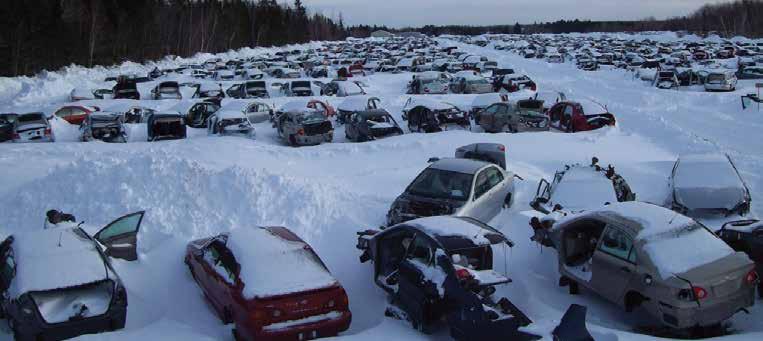
With people from across the globe bidding for the same diminishing number of salvage vehicles, we presently see a steadily growing number of competitors taking risks on expensive, long-term investments like the ones Bastarache Auto Salvage specializes in. In the past, we were able to acquire a large selection of vehicles; nowadays, it is more of a battle.
“As the pandemic continued, the perfect storm it created for the Bastarache family business did not abate. Even as the prices began to rise, the business, somehow, managed to continue to thrive. This situation has been both good and bad for our business. As we began to compete more and more for salvage, we have been seeing an increase in part orders from outside the province.”
Bastarache Auto Salvage was, like many other businesses, seeing an increase in its online sales as people from across Canada embraced digital shopping. This increase in out-of-province customers wasn’t the only thing keeping the business sharp. Its loyal local customer base also continued to frequent it.
Moncton, like many other areas in New Brunswick which remained largely virus free—making the shop itself a welcome place for house-bound car enthusiasts.
“Some things just don’t change. People do like to come to our store to see that they have been treated properly.”
Ron is happy to say that despite the fact that the market conditions continue to look rocky, the business has been able to keep all of its employees. Now more than six months into the pandemic, he is also confident that the whole team will remain intact.
Moreover, he feels that while the auto recycling sector can see other challenges on the horizon, keeping the business going through this pandemic will be the last major crisis of his career.
“In the next fifteen years, the price for electric vehicles might be low enough that the auto recycling industry will need to have a plan for dealing with them. With the new technology, it could also mean that there will be less accidents,” says Ron. “Perhaps things might be more bumpy than they are now, but who’s to know? We will deal with those circumstances when they arise.
In Ron’s mind, the solutions to these problems are likely to come from the succeeding generation of Bastaraches. Ron’s two sons and one of his nephews are building their career might be worthy prospects of the family business.
“I will leave the future problems for the next generation to cope with.”
A cold winter:“When the first cases of the virus arrived in Canada, things were unstable for at least a couple of weeks. With no travelling from out-of-province, and not much from within it, the number of walk-in clients we saw dropped significantly,” said Ron Bastarache. Un hiver froid: “Lorsque les premiers cas du virus sont arrivés au Canada, les choses étaient instables pendant au moins deux semaines. Comme il n’y avait pas de déplacements en dehors de la province, et peu de déplacements à l’intérieur de la province, le nombre de clients sans rendez-vous que nous avons vus a considérablement diminué”, a déclaré Ron Bastarache.
paraître difficiles, l’entreprise a pu garder tous ses employés. Maintenant plus de six mois après le début de la pandémie, il est également convaincu que toute l’équipe restera intacte de l’autre côté. De plus, il estime que, même si le secteur du recyclage automobile peut voir d’autres défis à l’horizon, maintenir l’entreprise en marche pendant toute la pandémie sera le plus grand défi de sa carrière.
«Dans quinze ans, les prix des véhicules électriques seront suffisamment bas pour que l’industrie du recyclage automobile doive avoir un plan pour y faire face. Les nouvelles technologies signifieront également qu’il y aura moins d’accidents », dit Ron. «Les choses pourraient être encore plus difficiles qu’elles ne le sont maintenant, et je ne sais pas comment l’aborder - je ne pense pas que quiconque le fasse.
Dans l’esprit de Ron, les solutions à ces problèmes viendront probablement de la prochaine génération de Bastaraches. Déjà des membres expérimentés de l’équipe, les deux fils et le neveu de Ron ressemblent à de dignes héritiers de l’entreprise familiale.
“Je vais laisser ces problèmes pour eux de résoudre.” CAR
The Auto Recyclers Association’s 2020
Locked down, but ready to go
By/Par Gideon Scanlon
ARA Executive / Exécutif ARA
2020 de l’Association des recycleurs automobiles
Verrouillé, mais prêt à partir
ACTING PRESIDENT / PRÉSIDENT PAR INTÉRIM Scott Robertson Robertson’s Auto Salvage, Massachussetts FIRST VICE PRESIDENT / PREMIER VICE-PRÉSIDENT Marty Hollingshead Northlake Auto Recyclers, Indiana SECRETARY-TREASURER/ SECRÉTAIRE-TRÉSORIER Shan McMillon Cocoa Auto Salvage, Florida SECRETARY/ SECRÉTAIRE Nick Daurio Daurio Auto Truck Pueblo, CO IMMEDIATE PAST PRESIDENT / PRÉSIDENT SORTANT IMMÉDIAT Jonathan Morrow M&M Auto Parts, Virginia
In April, the Auto Recycler’s Association cancelled its annual Hill Day event due to the global pandemic. For the past few years, Hill Days has brought industry leaders together in order to educate government figures in the U.S. capitol about the challenges facing the auto recycling sector.
Despite this, the ARA continued to work for the interests of auto recyclers in the American capitol. In October, the ARA joined a group of more than 480 trade groups representing a broad range of industries to urge Congress to support the business liability protections contained in the SAFE TO WORK Act.
ARA has introduced their new ROE logo to represent the Recycled Original Equipment auto parts the industry sells. This term and logo have been registered and trademarked and ARA is making a big push to use to encourage industry adoption - both with recyclers but also with insurers, repairers and the various data networks.
The pandemic also affected the plans for the ARA 77th annual convention and exposition. The event, which was to be held in Reno, Nevada in November, was cancelled and replaced with a digital alternative.
Instead, the ARA’s 77th annual convention and exposition was held online from November 11-13. Called Edge 2020, the web-based event aimed to provide ARA members with information that would provide them with an edge in the competitive and challenging auto recycling sector of the 2020s.
The event was opened by past-president Jonathan Morrow, who hosted a guided tour of B&R Auto Wrecking’s Corvallis, Oregon facility. In the tour, the operation’s general manager, Jeff Mackie, explained how B&R Auto Wrecking managed to keep its 19 locations in three states operating at peak efficiency through the pandemic. According to Mackie, the key to the event’s success was its co-ordinated approach to sales, dismantling and warehousing.
In his keynote speech, Blake Stratton of Michael Hyatt and Company, Stratton provided an abbreviated lesson on a four-step system for growing E n Avril, le Auto Recycler’s Association annule leur événement annuel Hill Day a cause de la Pandémie COVID-19. Au cours des quelques années, Hill Days a réuni des chefs de l’industrie afin d’éduquer les responsables gouvernementaux américains sur les défis auxquels le secteur du recyclage automobile est confronté.
Malgré l’annulage de Hill Days, l’ARA continue à travailler pour les intérêt des recycleurs automobiles dans la capitale américaine. En octobre, l’ARA a devenu une de 480 groupes commerciaux représentant un large éventail d’industries pour exhorter le congrès à soutenir les protections en matière de responsabilité des entreprises contenues dans les lois SAFE TO WORK
L’ARA travaille également avec la coalition de liabilité de COVID de la Chambre de commerce des États-Unis. L’organisation exprime également son soutien à l’élargissement de la couverture d’une deuxième série de prêts du programme de protection des chéques de paie, qui devraient être distribués uniquement aux entreprises qui peuvent montrer que leurs recettes brutes ont été réduites de 50% en raison de la pandémie.
La pandémie a également affecté les plans de la 77e convention et exposition annuelle de l’ARA. L’événement, qui devait se tenir à Reno, Nevada en novembre, était annulé et remplacé avec une alternative numérique.
Au lieu de cela, la 77e convention et exposition annuelle de l’ARA a eu lieu en ligne du 11 au 13 novembre. Appelé Edge 2020, l’événement en ligne visait à fournir les membres de l’ARA l’information qui leur donneraient un avantage dans le secteur concurrentiel et stimulant du recyclage automobile des années 2020.
L’événement était inauguré par l’ancien président Jonathan Morrow, qui avait organisé une visite guidée de l’installation B&R Auto Wrecking à Corvallis, Oregon. Au cours de la visite, le directeur général de l’opération, Jeff Mackie, explique comment B&R Auto Wrecking a réussi à maintenir ses 19 sites dans trois États fonctionnant à un niveau d’efficacité maximal pendant la
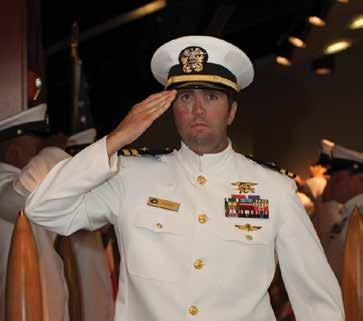
After being shot seven times during a skirmish in Fallujah in 2007, U.S. Navy Seal Jason Redman continued to serve as an officer for six years, before embarking on a career as a motivational speaker.
Après avoir été abattu sept fois lors d’une escarmouche à Fallujah en 2007, Jason Redman a continué à servir comme officier pendant six ans, avant de se lancer dans une carrière de conférencier motivateur.
businesses while working less. According to Stratton, this system has been used by Michael Hyatt and Company consultees to grow their businesses by an average of 67 percent in the first year, while reducing the average number of hours worked by business managers by 11.
In a roundtable discussion called Surviving 2020, four industry experts-Greg Daurio of Duario Auto Parts, Tom Andrade of Everett’s Auto Parts, Shan McMillon of Cocoa Auto Salvage, and Ryan Falco of Midway Auto Parts, discussed the unforeseen challenges of 2020, which have disrupted and changed the business world. The lively discussion covered everything from COVID-19 impact on auto recycling, to the crisis management techniques utilized by recyclers during the darkest days of the pandemic.
The event also featured several presentations on new ways to use existing technologies to overcome challenges facing the auto recycling sector.
Car-Part’s Jeff Wissman’s presentation on the Car-Part Interchange Plus eco system served as a tutorial for using the technology to capitalize on sales and inventory opportunities available to recyclers using Checkmate, PowerLink2 and Pinnacle, as well as buying opportunities for recyclers using Checkmate.
Hollander’s Powering the Auto Recycling Industry with Interchange, presented by Brandon Mullins, reviewed how the software provider had made changes to Interchange. Mullins also explained how Hollander’s recent data center move could provide long-term advantages for the auto recycling industry.
The event was capped-off with a closing address from former U.S. Navy Seal Jason Redman, a motivational speaker who encouraged ARA members to embrace a new attitude to life—one of embracing and understanding dangers.
“In our careers and personal lives, we seek a clear path to accomplish our goals. We want that uncanny awareness to detect obstacles. We desire to maintain the overcome mindset to stay the course,” Redman told listeners. “To do this, we must develop our own Pointman intellect! We will explore the tools you need in order to become your own Pointman to crush your goals!” pandémie. Selon Mackie, la clé du succès de l’événement était son approche coordonnée des ventes, du démantèlement et de l’entreposage.
Dans son discours principal, Blake Stratton de Michael Hyatt and Company a donné une leçon abrégée sur un système en quatre étapes pour les entreprises en croissance tout en travaillant moins. Selon Stratton, ce système était utilisé par les consultants de Michael Hyatt and Company pour développer leurs activités de 67% en moyenne la première année, tout en réduisant de 11 le nombre moyen d’heures travaillées par les chefs d’entreprise.
Lors d’une table ronde intitulée Surviving 2020, quatre experts de l’industrie - Greg Daurio de Duario Auto Parts, Tom Andrade de Everett’s Auto Parts, Shan McMillon de Cocoa Auto Salvage et Ryan Falco de Midway Auto Parts, ont discuté des défis imprévus de 2020, qui ont perturbé et changé le monde des affaires. La discussion animée a tout couvert, de l’impact du COVID-19 sur le recyclage automobile aux techniques de gestion de crise utilisées par les recycleurs pendant les jours les plus sombres de la pandémie.
L’événement comprenait également plusieurs présentations sur les nouvelles façons d’utiliser les technologies existantes pour surmonter les défis auxquels est confronté le secteur du recyclage automobile.
La présentation de Jeff Wissman de Car-Part sur l’écosystème Car-Part Interchange Plus a servi comme tutoriel pour utiliser la technologie à tirer parti des opportunités de vente et d’inventaire disponibles pour les recycleurs utilisant Checkmate, PowerLink2 et Pinnacle, ainsi que des opportunités d’achat pour les recycleurs utilisant Checkmate.
Hollander’s Powering the Auto Recycling Industry with Interchange, présenté par Brandon Mullins, examine comment les fournisseurs de logiciels avaient apporté des modifications à Interchange. Mullins a également expliqué comment le récent déménagement du centre de données de Hollander pourrait offrir des avantages à long terme à l’industrie du recyclage automobile.
L’événement était couronné par un discours de clôture de l’ancien U.S.Navy Seal Jason Redman, un conférencier motivateur qui encourage les membres de l’ARA à adopter une nouvelle attitude face à la vie - celle d’accepter et de comprendre les dangers.
«Dans notre carrière et notre vie personnelle, nous cherchons un chemin clair pour atteindre nos objectifs. Nous voulons que cette conscience étrange détecte les obstacles. Nous souhaitons maintenir l’état d’esprit dépassé pour garder le cap», a déclaré Redman aux auditeurs. «Pour ce faire, nous devons développer notre propre intelligence de Pointman! Nous explorerons les outils dont vous avez besoin pour devenir votre propre Pointman et écraser vos objectifs!» CAR
